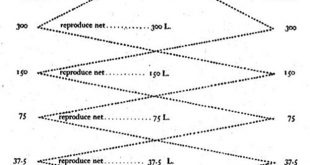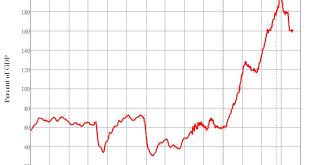I have observed and appreciated Olivier Blanchard’s intellectual journey over the last decade. It began in August 2008, with what must be regarded as one of the worst-timed papers in the history of economics. In a survey of macroeconomics entitled “The State of Macro”, he concluded, one year after the financial crisis began, that “The state of Macro is good” (Blanchard, 2008). However, Blanchard did not remain locked into that position, and he had the rare intellectual courage to...
Read More »Incorporating energy into production functions
In my last post on my Debtwatch blog, I finished by saying that the Physiocrats were the only School of economics to properly consider the role of energy in production. They ascribed it solely to agriculture exploiting the free energy of the Sun, and specifically to land, which absorbed this free energy and stored it in agricultural products. As Richard Cantillon put it in 1730: The Land is the Source or Matter from whence all Wealth is produced. The Labour of man is the Form...
Read More »BBC Hardtalk on reforming economics
This interview, which was just recorded today, will go to air tomorrow. The broadcast details are: BBC News Channel: 02.30 BST, 04.30 BST and 20.30 BST Tuesday 16th August 2016, and 00.30 BST Wednesday 17th August 2016 And from the 04.30 TX it will then be available within the UK on BBC iPlayer for one year. BBC World News Channel: 03.30 GMT; 08.30 GMT; 14.30 GMT and 19.30 GMT Tuesday 16th August 2016 It will also go out at numerous timeslots on Friday on the BBC World Service....
Read More »The need for pluralism in economics
For decades, mainstream economists have reacted to criticism of their methodology mainly by dismissing it, rather than engaging with it. And the customary form that dismissal has taken is to argue that critics and purveyors of alternative approaches to economics simply aren’t capable of understanding the mathematics the mainstream uses. The latest instalment of this slant on non-mainstream economic theory appeared in Noah Smith’s column in Bloomberg View: “Economics Without Math...
Read More »Inequality, Debt and Credit Stagnation
This was my keynote speech at the French Association for Political Economy (AFEP) annual conference in Mulhouse, France (the other keynote was given–in French–by my good friend Marc Lavoie, who is now based at the University de Paris 13). In this presentation, I: Disparage the “secular stagnation” explanation that Larry Summers has regurgitated for the tepid level of economic growth today. As did Hansen in the 1930s, Summers ponders “why growth would remain anaemic in the absence...
Read More »What next after Brexit?
A cliché—“Expect the Unexpected”—has happened. As I noted in “The Divisive Brexit Vote”, though I favoured Brexit, I took the opinion polls at face value, and expected that Britain as a whole would vote to remain in the EU. Instead, in the largest electoral turnout in twenty years, the UK voted 52:48 in favour of leaving the EU. I’ll leave a post-mortem of the vote itself for later; the main interest now is what will happen because of it. Many pundits from the Center, Left and...
Read More »The Divisive Vote Over Brexit
Andrew Watt has written a passionate critique of my support for Brexit (“Progressive economists should support Remain not Brexit – a response to Steve Keen”), and it highlights a key feature of this peculiar referendum: people who normally find themselves on the same side in most economic and political debates have been divided by this referendum. Andrew comments that he broadly agrees with my economic analysis on most issues, but vehemently opposes me here. Likewise, good friends...
Read More »There has to be a better way
Note: This was published as my last column on Business Spectator on April 6th, but it’s now gone missing after News Ltd merged BS with its own in-house stable and changed all the URLs. Given the election and Elizabeth Farrelly’s excellent thought piece in the Sydney Morning Herald “The great tragedy of Malcolm Turnbull“, I thought it was a good time to revive it. One of the disadvantages of growing up is finding in your old age that people you never took seriously in your youth...
Read More »CERN Discovers New Particle Called The FERIR
CERN has just announced the discovery of a new particle, called the “FERIR”. This is not a fundamental particle of matter like the Higgs Boson, but an invention of economists. CERN in this instance stands not for the famous particle accelerator straddling the French and Swiss borders, but for an economic research lab at MIT—whose initials are coincidentally the same as those of its far more famous cousin. Despite its relative anonymity, MIT’s CERN is far more important than its physical...
Read More »Zombies-To-Be and the Walking Dead of Debt
Using the dynamics of credit–which most other economists ignore–I explain why Japan, the USA and UK are among the “Walking Dead of Debt” and why China, Canada, Australia and South Korea are on their way to joining the Debt Zombies. This presentation is based on work I’m doing for a new 25000 word book for Polity Press entitled “Can we avoid another financial crisis?”, which should be published later this year. [embedded content]
Read More » Heterodox
Heterodox




